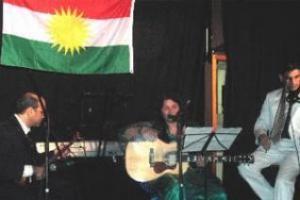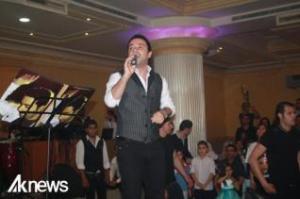
English woman wants to stop ethnic-cleansing of Syrian Kurds

Sheila Mosley was born in Zimbabwe, but her parents are from Yorkshire in the UK. Together with the Syrian Kurd Khalaf Dahowd, she has chosen to promote the situation of Kurds from Syria as co-chair of the International Support Kurds in Syria Association.
Where are you from? What's your professional background.
I was born in Zimbabwe, my parents are English - from Yorkshire in UK. We came back here when I was 8 years old, and then when we were going back, we were refused admission to what was then Rhodesia because of my father's stance for the rights of Africans, and we have lived here in UK since that time.
I am a qualified social worker, and for a while in 2008/9 I worked as a legal rep for people in the asylum system in UK. I currently work for an organization that promotes the voice of the child in the family courts when decisions have to be made about where they live and who they see.
How did you get involved with the Kurds? Do you know only Syrian Kurds?
I became involved with people seeking asylum in UK in about 2000, and began to find singers because I like to sing myself, so I was asking everyone 'do you sing'. The first Kurdish person I met this way was on a demonstration against the Afghan war. He is from Kurdistan-Iraq and is a political man who roused my interest in Kurdish history. Through him I met other Kurds and by March 2003 we were organising an event for Newroz. As time passed I met many other people from Kurdistan-Iraq. I also have some musician friends who are Kurdish from Iran including Hassan Darzi. I know a few musicians from Kurdistan-Turkey too.
Kurds here have been very welcoming and friendly, and they taught me about Kurdish culture and history, food, music and dancing. I built up a strong friendship with a man who went back to Raniya, Kurdistan-Iraq. He was political too but from a different Party, and he also worked tirelessly for his fellow-Kurds. We are still in contact.
Three years ago I met Khalaf Dahowd who is co-chair of SKS, with me. We were asked to help a Kurdish guy from Syria who had just survived a removal attempt by the UKBA and he needed a solicitor. Through this work, I began to meet other Kurds from Kurdistan-Syria and realized that I didn't know much about their story and nor did other people. That is why we've chosen to promote the situation of Kurds from Syria as our primary task.
What do you like about Kurdish culture?
Dolma, the sound of the shamshal, music and dancing (but I can't dance like the Kurds from Syria), their friendship and openness. I can't speak the language, and I think many Kurdish women have a difficult life because of the culture
How did you get the idea to start the International Support Kurds in Syria Association ‘SKS’? Since you are not Kurdish.
After speaking with friends, I started an email group to try to bring academics together with Kurds and others who could make a difference by working together. I would prefer to spend my energy making a difference in a political/human rights way, also my Government (UK) has been working on this issue in my name so I have an obligation to get involved. Khalaf had the idea of a starting a website and we work as a team. The name SKS came from 'Support Kurds in Syria' and we added 'International' because we want to work across borders, and 'Association' because we are a group. Anyone can join us if they are willing to accept our aims. These are written up on the website.
Why do you think there is less media attention for the Kurds in Syria, compared to Iraq and Turkey?
There are fewer Kurds in Syria, but also the Government is so oppressive that it is difficult to get information in or out. Our recent discussions with people who work in this area confirmed that there is now less information coming out, and that this is an indication of increasing oppression.
Do you think that the SKS can have influence on the situation of Kurds in Syria?
Yes, we want to find a way to bring the voice of Kurds in Syria to the world outside, and to work with others who are doing this. We want to bring this issue to the world and open the door to change through discussion and developing understanding.
Our reports are based sometimes on first-hand reports and other times through other human rights organizations. We send them out by email to many organizations and individuals who we hope will take notice, and act on them before passing them on. In this way we directly make appeals to the international community including Governments, and we invite others to take up the appeals with us.
There is not much point asking the Syrian Government to change because they're unlikely to be interested in doing that. Evidence suggests that they would prefer to get rid of their Kurds one way or another, but the international community is interacting with the Syrian Government and we can have some impact on that if we join together.
Khalaf and I have the benefit as a team of one foot in the Kurdish world and understanding of Kurdish and Arabic language, and the other foot in the western world and a good understanding of English and our culture. We can find reports and talk to a wide range of organizations and people.
Is the SKS completely independent from Kurdish political parties?
Yes, Khalaf and I are clearly affected by our own individual political outlooks but we do not bring any Party Politics to bear on SKS. Our views may co-incide with Political Parties sometimes, but we would choose only to take what we agree with and leave the rest. We will sometimes be influenced by what someone has said or done but that is different from supporting a Party.
People who belong to a Party have duties and obligations to that Party that bind them. We don't have those chains to hold us back. We can say what we think is right for Kurds.
Does it has any contacts with Syrian Kurdish parties? Like PYD, Yekiti and others?
We have contact with individuals who belong to and speak on behalf of Political Parties. We are aware that proscribed groups do not have a voice and we have to tread carefully to stay within the law, but sometimes what they say is very sensible and we will not shy away from reporting this. Khalaf is a member of the Kurdish Yekiti Party in Syria - UK Branch. He was the media relations committee member.
What are the negative and good points of the recent HRW report on the Syrian Kurds?
The HRW report is the result of 5 years of research, which gives it real credibility. It's not been written quickly, and it is based on fact and research amongst Kurds in Syria. Any researcher is limited by the situation there - people cannot talk freely without fearing retribution, but as this has built on information coming in over time, it must be regarded with high respect.
Our disappointment comes in their call to the international community. We wish it were stronger. All Western Governments will say they mention human rights abuses of Kurds in dealings with the Syrian Government, but that is not enough. They need to make any dealings conditional on positive change for the Kurds. Throughout recent history, Kurds have been used where it suits someone else's purpose and then they are discarded when they are not needed any more. That is not good enough. The doors to the international community are opening and the situation for Kurds in Syria is becoming worse. How can this be right? Making the abuse 'part of the discussions' is not a strong demand. The demand needs to be proportionate to the abuse, not to the advantage that the other country can get for itself, or for 'peace' in the Middle East. How can it be 'peace' when people are suffering like this.
The report details the major means of control - the State of Emergency, Decree 49. There are areas that HRW have not touched on, probably because it fell outside their remit. Kurdish conscripts have been killed whilst in the army - they have bullets in their heads, but their families are told they committed suicide.
Also water is a big issue. The area is suffering the effects of climate change and there is less rain in the Kurdish areas than there used to be. This has been an agricultural area. The Syrian Government is not bringing aid to these people. At the same time, Turkey is re-directing water back into itself away from the Kurdish area of Syria, so there are two water-based pressures driving people out of their Kurdish homelands. This together with the effects of Decree 49 is leading to an ethnic cleansing of Kurds from the region. Discussions with Turkey to open the Turkey/Syria border will be another way to influence people to go.
We would like to see the HRW report being taken seriously across the world before ethnic-cleansing of Kurds, or genocide comes.
More info: http://supportkurds.org
- Add new comment
- 4680 reads


